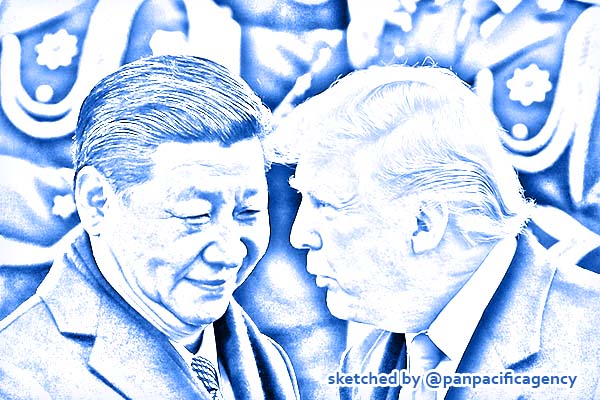[Analytics] Threat to delist Chinese companies in US panned

Xi Jinping described Donald Trump as a friend during his speech in St Petersburg on Friday. Photo: AP. Sketched by the Pan Pacific Agency.
If measures reportedly being considered by US officials to delist Chinese equities from exchanges in the United States were to take effect, they would likely have limited impact on Chinese investments but deal a heavy blow to investor confidence in financial markets in the US, experts said. Zhou Lanxu and Wang Yu specially for the China Daily.
The US government is not contemplating blocking Chinese companies from listing shares in the US “at this time”, Monica Crowley, spokeswoman for the US Treasury, told Bloomberg over the weekend, in response to media reports that Washington is considering removing Chinese companies from US stock exchanges.
The reports came as Chinese Vice-Premier Liu He is about to lead China’s negotiating group to the 13th round of China-US high-level economic and trade consultations. The meeting will be held in Washington in the week after the National Day holiday, which ends on Oct 7, the Ministry of Commerce said on Sunday.
Bob McCooey, chairman of Nasdaq Asia-Pacific, said on Sina Weibo on Sunday that the US exchange, where many Chinese technology firms such as Baidu and JD are listed, will always “be supportive of Chinese issuers” as part of its commitment to providing non-discriminatory access to all eligible companies.
The possibility of such measures being imposed in the future could not be totally ruled out, despite the denial by the US Treasury, because of the US administration’s earlier swings in the protracted trade dispute with China, said Xue Yi, a professor of finance at the University of International Business and Economics in Beijing.
“But such measures, if taken, would have only limited impact on Chinese firms and markets. I don’t think it would make any economic sense for the US side,” Xue said.
Chinese companies listed in the US — which are the outstanding performers in the country’s fast-growing economy — would be welcomed by other bourses if they were forced to delist from US exchanges, Xue said.
“They may choose to relist on Shanghai’s newly launched sci-tech innovation board, called the STAR Market, where they may raise more money than in the US, as domestic investors are generally more enthusiastic about their prospects. This would be a good chance for the STAR Market to jazz up its global influence,” Xue said.
Delisting Chinese firms would not only pose barriers for US investors to optimize their portfolios but drastically undermine the reputation of the US as a champion of a free and open financial market, Xue said.
“If the US stock exchanges excluded Chinese companies, it would mean the exchanges could also exclude companies from other economies,” he said, which would divert them from the US.
Bloomberg also reported on Friday that the US administration is considering blocking US government pension funds from investing in the Chinese market, as well as placing investment limits on Chinese companies included in stock indexes managed by US firms, Bloomberg reported on Friday.
The report rattled US investors ahead of the resumption of trade talk between the world’s two largest economies. The S&P 500 Index started to plunge after the report and ended 0.53 percent lower, at 2961.79, on Friday.
“Possible investment limits from the US administration will not change the trend of capital inflow into the China’s A-share market,” said Dong Dengxin, director of the Finance and Securities Institute at Wuhan University of Science and Technology.
The growing potential and low valuation of Chinese equities, coupled with the country’s commitment to financial opening-up, have made Chinese equities increasingly attractive for worldwide money managers, Dong said.
The impact on sentiment may lead to short-term market fluctuations but can hardly hurt the long-term upward trend of the A-share market, as foreign money has never been, and is not likely to be, the main drive of any bull run in the domestic market, said Zhao Xudong, an independent market analyst.